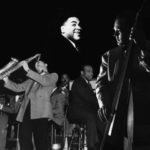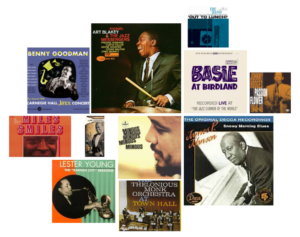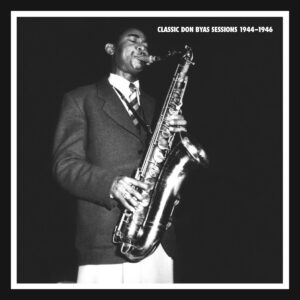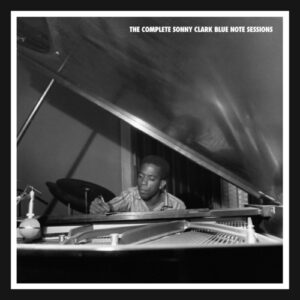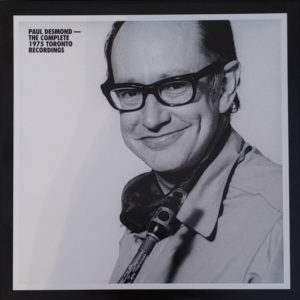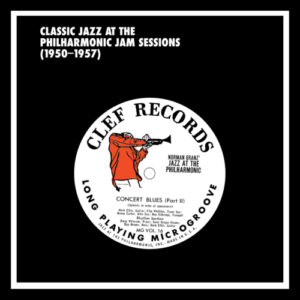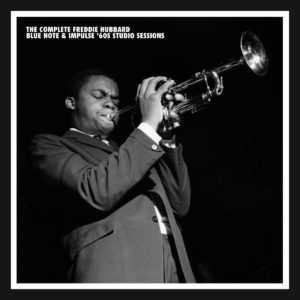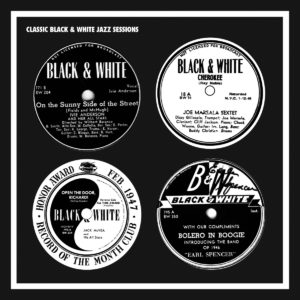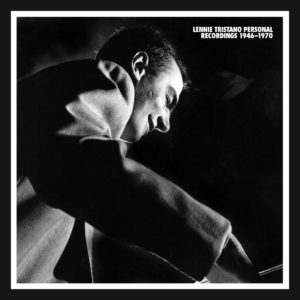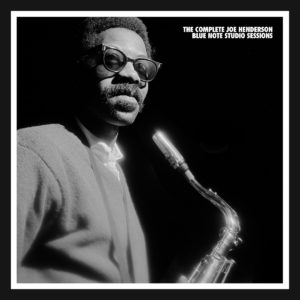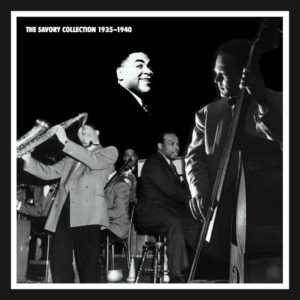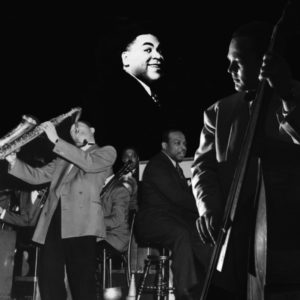Artie Shaw
“Artie Shaw could execute like mad. I like Artie for the things that were almost impossible to do on the clarinet." – Barney Bigard
When band leader Artie Shaw put down his clarinet in 1954 – vowing never to play again – he made a “forever” decision most of us could never contemplate. Artie Shaw had been the #1 bandleader in the world. He had recorded countless tunes that were considered then, and will be thought of always, as classics.
Along with one or two other names, none ranked higher as an innovator on his instrument. Add to that his matinee idol, dashing good looks that made him admired across the globe. Read any evaluation of Artie Shaw’s work, and so often a song title will be followed by the phrase “which became a classic.” From early recordings as a bandleader, which almost instantaneously established him as a star, to his underappreciated post-War recordings, it is a substantial body of work that few jazz artists will ever achieve.
Stardust
Artie Shaw’s tone soared ethereally, and his song sense bordered on perfection. Witness Artie Shaw’s half-chorus in his 1940 recording of “Stardust.” The entire recording, from top to bottom, is like something from another world. Billy Butterfield’s trumpet lead-in couldn’t be more gorgeously bell-like, and trombonist Jack Jenney finishes Shaw’s chorus on some kind of cloud. There isn’t one note out of place, and you’d be hard pressed to find a more perfect recording. – Alan Goodman
By John McDonough
Born May 23, 1910, on the Lower east Side of New York, Artie Shaw grew up in New Haven, CT, where he quit high school and began his career a working musician in his mid-teens. By the middle of 1931, Artie Shaw began the long grind that would carry him through the worst years of the Depression. He was not alone. Benny Goodman, Tommy and Jimmy Dorsey, Glenn Miller, Bunny Berigan and others were all in the same boat, great jazz musicians making a living playing bland commercial music far below their capacities.
There was a restive frustration in the ranks of this young generation of virtuosos, bored with the tedium of bands led by singers, showmen and musical bureaucrats whose principle instrument was often a baton. It seemed unjust that the least accomplished musicians should be telling the most accomplished ones what to do.
In 1933, in a Thoreauesque gesture, Artie Shaw retired to the rural life of Erwinna, Pennsylvania, to reflect and write large thoughts on the life of Bix Beiderbecke. After a year, however, with no book or especially sizable thoughts forthcoming, Artie Shaw came to appreciate the burdens of his own ignorance. He returned to New York to resume the grind that would lead to his first strike at the big time in the spring of 1936.
Meanwhile, other things were happening during that critical time frame. Artie Shaw was not the only young musician restless with authority and eager to break the monopoly of those sweet bands. Benny Goodman was another. And in the fall of 1934, he decided that just maybe he could be the one to do it.
Parleying a partnership with Fletcher Henderson and weekly national exposure on NBC into a recording contract with Victor and an MCA-backed national tour in 1935, he hit pay dirt in California and finally at the Congress Hotel in Chicago. By the winter of 1935-36 everyone was talking about swing.
Two weeks after the first Super Chief rolled out of LaSalle Street Station in Chicago, Artie Shaw rolled out his Interlude In B Flat in New York at the Imperial Theater, and for the first time fame began rolling his way. The occasion was the city’s first swing concert. That was when the world outside of Local 802 started to notice the contrary clarinetist. Down Beat picked up the scent at once. “Next came Artie Shaw” – who was not yet even a blip in the magazine’s first Readers Poll. “His string swing ensemble…stole the show for novelty.…Applause tore down the house and necessitated many a bow. Four star stuff.”
Stardom now beckoned. Within three weeks Artie Shaw was recording his first records as leader for Brunswick and “the Artie Shaw business,” as he would later say, was underway. At the same time Tommy Rockwell brought Artie Shaw into the ranks of Rockwell-O’Keefe, an agency founded in 1933 on Rockwell’s management of Bing Crosby and now the second largest band booking office in America. It put him on the road with a band built on the string ensemble with a small brass section added.
For the next two years Artie Shaw circled the Holy Grail the big time with an unmitigated, almost desperate persistence. He found himself on a terrible but invigorating treadmill. In the spring of 1937 he dropped the strings and reorganized as a straight swing big band. When that didn’t move the needle, he replaced Rockwell-O’Keefe with MCA, hoping for better bookings. But MCA was Benny Goodman’s agency, and according to Artie Shaw, Goodman threatened to quit if Shaw “wasn’t stopped.”
He returned to Rockwell-O’Keefe early in 1938 but still didn’t have a clear vision of what he wanted. Dissatisfied with his Brunswick output, he stopped commercial recording altogether after 1937. It would be seven months before Artie Shaw made another record, this time for Victor’s subsidiary label, Bluebird Records.
Artie Shaw
Begin The Beguine
As Artie Shaw’s fame crept forward, he ran into the inevitable comparisons with Benny Goodman. “The chief objection to Art Shaw’s new band,” critic George Frazier wrote in Down Beat in April 1938, “is its Goodmanish inclination.… [I]t packs some slick talent. But…I was constantly reminded that Benny does the same sort of thing so much better.” Two months later came the push back as the magazine reversed itself. “Cripes! Artie Shaw Doesn’t Sound Like Goodman!” the headline shouted. So, which was it?
Contemporary press accounts in the trades suggest audiences didn’t really care what Down Beat or George Frazier thought. They were starting to listen to Artie Shaw because the big band simply sounded terrific. And when stories like the girls school dance in Wellesley got talked around, it only whetted fans’ appetite for more. During a dance date in late March at the Pine Manor Girls Junior College, the dean reportedly became alarmed at band’s heat and demanded that Shaw “stop playing that kind of music” or he would never play the school again. Naturally, Artie Shaw ignored the order and poured it on.
Maybe something had intervened that spring to put Artie Shaw onto the express track. When band patron and ballroom manager Si Shribman got behind the band, bookings and airtime improved. Or perhaps it was just the invisible hand of evolution on the music. The evidence on that is sketchy. Except for a transcription session in February, the band went completely unrecorded between December and July, and none of its Tuesday or Saturday Boston broadcasts seem to have survived.
This is especially unfortunate since it was on March 14 that Artie Shaw brought Billie Holiday into his band as vocalist, a tenure largely lost to us except for her famous Bluebird version of Any Old Time. The critics were ecstatic. “What a combination the Artie Shaw and Billie Holiday one is,” wrote a Boston writer in April. “Something to make the ‘cats’ lick their chops about.”
The band was playing relentlessly and people were starting to listen. “This is to acquaint the brethren with the biggest hunk of jazz dynamite now languishing in the shade of the old one-night stand,” wrote Down Beat’s John Monro, a true believer eager to spread the early word and frankly jolt the band from its low-grade stupor.
It was June 1938. “My reason for penning this piece is a sincere belief that given decent publicity break, Artie Shaw has the musical genius and honesty to start a trend in popular taste toward a real renaissance in solid jazz….It sounds to me, and has all winter, like just about the finest jazz ever to assail these hardened ears.” He described Shaw as “a stubborn guy, and intelligent,” then enumerated a litany of bad breaks that had hit the band, including poor publicity, “rotten schedules, layoffs, pay, cuts and the rest of the one-night miseries.” But he made a prediction: “It is this opinion that if honest musicianship counts for anything any more, Artie Shaw deserves to be the smash musical hit of 1938-39.”
Rarely would a prediction pay off so promptly or profusely. Within a month Artie Shaw would resume recording, now for Bluebird. The first tune of the first record date he made in late July was Begin The Beguine, the spark was struck that would carry Artie Shaw to the top. – John McDonough, liner note excerpt Classic Artie Shaw Bluebird And Victor Sessions (Mosaic Records)
Classic Artie Shaw Bluebird And Victor Sessions
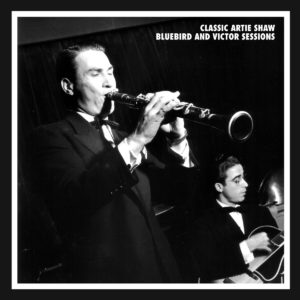
“Begin The Beguine” “Frenesi” “Stardust
They Are Landmarks In Jazz
When band leader Artie Shaw put down his clarinet in 1954 – vowing never to play again – he made a “forever” decision most of us could never contemplate. He had been the #1 bandleader in the world. He had recorded countless tunes that were considered then, and will be thought of always, as classics. Along with one or two other names, none ranked higher as an innovator on his instrument. Add to that his matinee idol, dashing good looks that made him admired across the globe. Give all that up?
Yet, before he did, Shaw created a body of work that few artists will ever achieve. And the best of that music is finally available in a massive Mosaic volume. This limited edition collection presents all the recordings that focused on instrumentals by his big band, the Gramercy 5 and representative vocal performances by Tony Pastor, Billie Holiday, Hot Lips Page and Lena Horne.
Read any evaluation of Shaw’s work, and so often a song title will be followed by the phrase “which became a classic.” Those classics are all here. From early recordings as a bandleader, which almost instantaneously established him as a star, to his underappreciated post-War recordings, Mosaic’s collection presents all his most famous performances, and many previously-unheard alternates.
If you are unfamiliar with Shaw’s work, prepare to be surprised. While so many other lauded artists of the swing era sound land-locked by the idiom, Shaw’s music remains eminently listenable to modern ears.
Artie Shaw Like You’ve Never Heard – Superior Audio Restoration
Artie Shaw’s tone soared ethereally, and his song sense bordered on perfection. Witness Shaw’s half-chorus in his 1940 recording of “Stardust.” The entire recording, from top to bottom, is like something from another world. Billy Butterfield’s trumpet lead-in couldn’t be more gorgeously bell-like, and trombonist Jack Jenney finishes Shaw’s chorus on some kind of cloud. There isn’t one note out of place, and you’d be hard pressed to find a more perfect recording.
Barney Bigard, a staple of the Ellington band from 1927-1942 stated that Shaw made “…the clarinet sound unusually beautiful in the upper register. The guy could execute like mad…(and) I like Artie for the things that were almost impossible to do on the clarinet.” His solo efforts were clean, clear and soaring with a strong and polished attack that was full of melodic invention. A weaving of ideas that perfectly connected one thought to another.
Our set includes over 150 tracks on 7 CDs, and presents for the first time anywhere 12 unissued performances. To offer the finest sound possible, we’ve located the original metal parts and pristine vinyl test pressings from the Victor and Bluebird vault. Our lavish booklet includes an appreciation and session analysis by John McDonough and features many rare photographs of Shaw and his bandmates. Don’t miss out on owning this important collection.
To the best of our knowledge, this discography is presented in the order in which each take was recorded. However, the CDs contained in this set are sequenced with the master take first and then any alternates at the conclusion of the disc. Any alternate takes that have been listed in discographies but are no longer in the vaults are listed as unissued, master no longer exists.
________________________________________________________________________
(A) ART SHAW AND HIS ORCHESTRA: Chuck Peterson, Claude Bowen, John Best (tp), George Arus, Ted Vesely, Harry Rodgers (tb), Artie Shaw (cl), Les Robinson, Hank Freeman (cl, as), Tony Pastor (cl, ts, vcl), Ronnie Perry (cl, ts), Les Burness (p), Al Avola (g), Sid Weiss (b), Cliff Leeman (d), Billie Holiday (vcl).
NYC, July 24, 1938
024079-1 Begin The Beguine (AS, JG-arr) BB B-7746
024080-1 Indian Love Call (TP-vcl) (JG-arr) –
024081-2 Comin’ On (AS-arr) BB B-7772
024082-1 Back Bay Shuffle (JB-arr) BB B-7759
024083-1 Any Old Time (BH-vcl) (AS-arr) –
024084-2 I Can’t Believe
That You’re In Love With MeASC-8 (LP)
024084-1 I Can’t Believe
That You’re In Love With MeBB B-7772
Note: Later Bluebird pressings of Indian Love Call show a 3R, 4 or a 7 in the take area portion of the run-off groove (the 9:00 position). These are not different takes, but dubs of the master take (-1).
Some discographies, including the one listed on the LP The Complete Artie Shaw Volume 1 / 1938-1939 (Bluebird AXM2-5517), list the master take as -3 for Comin’ On. However, a comparison with the metal part and the 78 confirms that -2 is the master take.
Back Bay Shuffle has been listed in some discographies as having the master take issued using -2. However, the metal part confirms the take as -1.
________________________________________________________________________
(B) ARTIE SHAW AND HIS ORCHESTRA: Chuck Peterson, Claude Bowen, John Best (tp), George Arus, Russell Brown, Harry Rodgers (tb), Artie Shaw (cl), George Koenig, Hank Freeman (cl, as), Tony Pastor (cl, ts, vcl), Ronnie Perry (cl, ts), Les Burness (p), Al Avola (g), Sid Weiss (b), Cliff Leeman (d).
NYC, September 27, 1938
027229-1 Nightmare (AS-arr) BB B-7875
027230-1 Non-Stop Flight (AS-arr) –
027231-1A Yesterdays (AS, JG-arr) previously unissued
027231-1 Yesterdays (AS, JG-arr) BB B-10001
027232-1 What Is This Thing Called Love? (JG-arr)
________________________________________________________________________
(C) Same as (B) except Les Robinson (as) replaces Koenig.
NYC, November 17, 1938
028977-1 Softly, As In A
Morning Sunrise (AS, JG-arr)BB B-10054
028978-1 Copenhagen (JG-arr) –
________________________________________________________________________
(D) ARTIE SHAW AND HIS ORCHESTRA: Chuck Peterson, Bernie Privin, John Best (tp), George Arus, Harry Rodgers, Les Jenkins (tb), Artie Shaw (cl), Les Robinson, Hank Freeman (as), Tony Pastor (ts, vcl), Georgie Auld (ts), Bob Kitsis (p), Al Avola (g), Sid Weiss (b), George Wettling (d).
NYC, December 19, 1938
030735-1 Jungle Drums (JG-arr) BB B-10091
030736-1 It Had To Be You (AS, JG-arr) –
________________________________________________________________________
(E) Same as (D) except Buddy Rich (d) replaces Wettling.
NYC, January 17, 1939
031491-1 Lover, Come Back To Me (JG-arr) BB B-10126
031492-1 My Heart Stood Still (JG-arr) BB B-10125
031493-1 Rosalie (TP-vcl) (AA-arr) BB B-10126
031495-1 Vilia (AS-arr) -1 BB B-10128
-1 Hank Freeman doubles on bass clarinet on Vilia.
Note: Some discographies list a -2 as an issued take for Rosalie, however, -1 is the only take that has surfaced as of the printing of this discography.
________________________________________________________________________
(F) Same as (E).
NYC, January 23, 1939
031823-1 The Man I Love (JG-arr) BB B-10128
031824-1 The Donkey Serenade (JG-arr) BB B-10125
031826-1 Zigeuner (JG-arr) BB B-10127
031827-1 Carioca (AS, JG-arr) BB B-10124
The liner notes to the LP My Concerto (RCA Victor LPT 1020) erroneously states that The Man I Love was previously unreleased.
________________________________________________________________________
(G) Same as (E).
NYC, January 31, 1939
031864-1 Alone Together (AS, JG-arr) BB B-10148
031865-1 Rose Room (AS-arr) –
031869-1 Delightful Delirium (TP-vcl) (AS, JG-arr) BB B-10134
________________________________________________________________________
(H) Same as (E).
NYC, March 12, 1939
032963-1 Prosschai (TP-vcl) (AS, JG-arr) BB B-10188
032965-1 I’m Coming Virginia (AS, JG-arr) BB B-10320
032966-1 Pastel Blue (AS, CS-arr) BB B-10178
Note: The Bluebird logs list Blue Dilemma as the original title for Pastel Blue.
Some discographies list a -2 as an issued take for Pastel Blue, however, -1 is the only take that has surfaced as of the printing of this discography.
________________________________________________________________________
(I) Same as (E).
NYC, March 17, 1939
035301-1 Snug As A Bug In A Rug (TP-vcl) (AS, JG-arr) BB B-10215
035303-1 One Night Stand (AS-arr) BB B-10202
035304-1 One Foot In The Groove (AS, WD-arr) –
________________________________________________________________________
(J) Same as (E).
Hollywood, June 5, 1939
036237-6 Octoroon (AS, JG-arr) BB B-10319
036239-7 When Winter Comes (TP-vcl) (AS, JG-arr) BB B-10307
036241-3 Out Of Nowhere (JG-arr) BB B-10320
Note: It is not known if the take numbers shown are the actual order of performance and why the common practice of assigning them in the order of preference is dispensed with for this and the next two sessions.
________________________________________________________________________
(K) Same as (E) except Hank Freeman doubles on baritone sax.
Hollywood, June 12, 1939
036264-1 I Can’t Afford To Dream unissued, master no longer exists
036264-2 I Can’t Afford
To Dream (TP-vcl) (AS, JG-arr)BB B-10324
036266-11 Go Fly A Kite (TP-vcl) (JG-arr) BB B-10347
036268-4 Traffic Jam (AS, TM-arr) BB B-10385
036269-7 Serenade To A Savage (JGa-arr) BB AXM2-5580 (LP)
Note: Some discographies (including the Bluebird LP AXM2-5580 shown above) credit the RCA Victor LP Moonglow (LPM 1244) as the first issue of Serenade to a Savage (-7). However, this LP used the master take recorded on June 22, 1939.
________________________________________________________________________
(L) Same as (K).
Hollywood, June 22, 1939
036269-10 Serenade To A Savage (JGa-arr) BB B-10385
________________________________________________________________________
(M) ARTIE SHAW AND HIS ORCHESTRA: Chuck Peterson, Bernie Privin, Harry Geller (tp), George Arus, Les Jenkins, Harry Rodgers (tb), Artie Shaw (cl), Les Robinson, Hank Freeman (as), Tony Pastor (ts, vcl), Georgie Auld (ts), Bob Kitsis (p), Al Avola (g), Sid Weiss (b), Buddy Rich (d).
NYC, August 27, 1939
042605-1 Put That Down In Writing (TP-vcl) (AS, JG-arr) BB B-10406
042609-1 Oh, Lady Be Good (AS, JG-arr) BB B-10430
042610-1 I Surrender, Dear (AS, JG-arr) -1 –
-1 The saxes double on clarinet.
________________________________________________________________________
(N) Same as (M).
NYC, September 28, 1939
042757-1 If What You Say Is True (TP-vcl) (AS, JG-arr) BB B-10446
042757-2 If What You Say Is True unissued, master no longer exists
________________________________________________________________________
(O) Same as (M).
NYC, October 26, 1939
043319-1 You’re A Lucky Guy (TP-vcl) (AS, JG-arr) BB B-10482
043319-2 You’re A Lucky Guy unissued, master no longer exists
________________________________________________________________________
(P) Same as (M) except Dave Barbour (g) replaces Avola and Freeman doubles on baritone sax.
NYC, November 9, 1939
043367-2 Shadows (AS, JG-arr) Vic 20-2865
043367-1 Shadows (AS, JG-arr) BB B-10502
Note: The Bluebird LP The Complete Artie Shaw Vol.III 1939-1940 (Bluebird AXM2-5556), issued -2 rather than -1 which is the take credited in the discography of this 2 LP gatefold. Some discographies also credit Camden CAS-908 September Song and Other Favorites (LP) as the first release for -2.
_______________________________________________________________________
(Q) ARTIE SHAW AND HIS ORCHESTRA: Mannie Klein, George Thow, Charles Margulis (tp), Randall Miller, Bill Rank, Babe Bowman (tb), John Cave (fr-h), Artie Shaw (cl), Martin Ruderman (fl), Phil Nemoli (oboe), Joe Krechter (b-cl), Blake Reynolds, Bud Carleton (as), Jack Stacy, Dick Clark (ts), Harry Bluestone, Mark Levant, Peter Eisenberg, Robert Barene, Sid Brokaw, Dave Cracov, Jerry Joyce, Alex Law (vln), Dave Sterkin, Stan Spiegelman, Jacques Ray (vla), Irv Lipschultz, Jules Tannenbaum (cello), Stan Wrightsman (p), Bobby Sherwood (g), Jud DeNaut (b), Carl Maus (d).
Hollywood, March 3, 1940
042546-1 Frenesi (AS, WGS-arr) Vic 26542
042547-1 Adios, Marquita Linda (AS, WGS-arr) –
042550-1 A Deserted Farm (WGS-arr) BB AXM2-5556 (LP)
________________________________________________________________________
(R) ARTIE SHAW AND HIS ORCHESTRA: Mannie Klein, Harry Geller, George Thow (tp), John Cave (fr-h), Artie Shaw (cl), Joe Kretcher (b-cl), Lyle Bowen, Ben Kantor (as), Jack Stacy, Harold Lawson (ts), Bill Brower, Sid Brokaw, Harry Bluestone, Jerry Joyce, Bob Morrow, Mischa Russell (vln), Sam Freed, Dave Sterkin (vla), Cy Bernard (cello), Skitch Henderson (p), Bobby Sherwood (g), Jud DeNaut (b), Spencer Prinz (d).
Hollywood, May 13, 1940
049690-1 April In Paris (BS-arr) Vic 26654
049691-1 King For A Day (BS-arr) –
________________________________________________________________________
(S) ARTIE SHAW AND HIS GRAMERCY 5-: Billy Butterfield (tp), Artie Shaw (cl), Johnny Guarneiri (harpsichord), Al Hendrickson (g), Jud DeNaut (b), Nick Fatool (d).
Hollywood, September 3, 1940
055061-1 Special Delivery Stomp (AS-arr) Vic 26762
055062-1 Summit Ridge Drive (AS-arr) Vic 26763
055063-1 Keepin’ Myself For You Vic 26762
055064-1 Cross Your Heart (AS-arr) Vic 26763
________________________________________________________________________
(T) ARTIE SHAW AND HIS ORCHESTRA: George Wendt, Jack Cathcart, Billy Butterfield (tp), Jack Jenney, Vernon Brown (tb), Artie Shaw (cl), Les Robinson, Neely Plumb (as), Jerry Jerome, Bus Bassey (ts), Truman Boardman, Ted Klages, Bill Brower, Bob Morrow, Alex Beller, Eugene Lamas (vln), Allan Harshman, Keith Collins (vla), Fred Goerner (cello), Johnny Guarnieri (p), Al Hendrickson (g), Jud DeNaut (b), Nick Fatool (d).
Hollywood, September 7-8, 1940 (9:00 p.m. – 12:45 a.m.)
055069-1 Temptation (AS, LH-arr) Vic 27230
055070-1 Chantez les bas (Sing ‘Em Low) (AS, WGS-arr) Vic 27354
________________________________________________________________________
(U) Same as (T).
Hollywood, October 7-8, 1940 (9:30 p.m. – 12:45 a.m.)
055097-1 Star Dust (AS, LH-arr) Vic 27230
055098-1 Marinella (WGS-arr) Vic 27362
055099-1 Danza Lucumi (WGS-arr) Vic 27354
________________________________________________________________________
(V) Same as (T).
Hollywood, December 3, 1940
055184-2 This Is Romance (HR, LH-arr) Vic 27343
055185-2 What Is There To Say? (LH, AS-arr) Vic 27432
055186-2 Pyramid (JG, LH, AS-arr) Vic 27343
Note: For all three titles a -1 exists as a metal part (and were used on two Bluebird re-issue LPs), however, they are all identical to the issued -2 master on 78.
________________________________________________________________________
(W) Same as (T).
Hollywood, December 4, 1940
055191-3 Blues – Pt.1 (AS, WGS-arr) Vic 27411
055192-3 Blues – Pt.2 (AS, WGS-arr) –
055193-2 Who’s Excited? (LH, WGS, RC-arr) Vic 27385
055194-2 Prelude In C Major (RC-arr) Vic 27432
Note: On both parts of Blues a -1 and -2 exist as a metal part. However they are identical to the issued -3 master on 78. For both Who’s Excited and Prelude in C Major a -1 exist as a metal part (and were used on two Bluebird re-issue LPs), however, they are all identical to the issued -2 master on 78.
Although credited on many re-issues as a Ray Conniff arrangement, the original chart of Who’s Excited (initially titled Cushion) states that this was partially arranged by Lennie Hayton and William Grant Still. Conniff may have had a hand in merging the two arrangements.
______________________________________________________________
(X) ARTIE SHAW AND HIS GRAMERCY 5-: Same as (S).
Hollywood, December 5, 1940
055195-1 Dr. Livingstone, I Presume? Vic 27289
055196-1 When The Quail
Come Back To San Quentin –
055197-1 My Blue Heaven Vic 27405
055198-1 Smoke Gets In Your Eyes Vic 27335
________________________________________________________________________
(Y) ARTIE SHAW AND HIS ORCHESTRA: George Wendt, Jack Cathcart, Billy Butterfield (tp), Jack Jenney, Vernon Brown, Ray Conniff (tb), Artie Shaw (cl), Les Robinson, Neely Plumb (as), Jerry Jerome, Bus Bassey (ts), Truman Boardman, Ted Klages, Bill Brower, Bob Morrow, Alex Beller, Eugene Lamas (vln), Allan Harshman, Keith Collins (vla), Fred Goerner (cello), Johnny Guarnieri (p), Al Hendrickson (g), Jud DeNaut (b), Nick Fatool (d).
Hollywood, December 17, 1940
055226-1 Concerto For Clarinet – Pt.1 (AS, LH-arr) Vic 36383 (12” 78)
055227-1 Concerto For Clarinet – Pt.2 (AS, LH-arr) – (12” 78)
_______________________________________________________________________
(Z) Same as (Y) except Clyde Hurley (tp) replaces Cathcart and some of the saxes double on clarinet.
Hollywood, January 23, 1941
055256-1 Dancing In The Dark (AS, LH-arr) Vic 27335
055257-1 I Cover The Waterfront (AS, LH-arr) Vic 27362
055258-1 Moonglow (AS, LH-arr) Vic 27405
055259-1 Alone Together (AS, LH-arr) Vic 27385
________________________________________________________________________
(AA) ARTIE SHAW AND HIS ORCHESTRA: probably Billy Butterfield, Bernie Privin, Lee Castle (tp), Vernon Brown, Jack Jenney, Ray Conniff (tb), Artie Shaw (cl), Les Robinson, Toots Mondello (as), Bus Bassey, Jerry Jerome (ts), Kurt Dieterle, Truman Boardman, Leo Persner, Leo Kahn, Dave Kahn, Dave Herman (vln), Bernard Ocko, Keith Collins (vla), Fred Goerner (cello), Johnny Guarnieri (p), Sam Herman (g), Eddie McKinney (b), Nick Fatool (d).
NYC, March 20, 1941
062767-1 If I Had You (AS, LH-arr) Vic 27536
062768-1 Georgia On My Mind (LH-arr) Vic 27499
062769-1 Why Shouldn’t I? (LH-arr) –
062770-1 It Had To Be You (AS, LH-arr) Vic 27536
Note: Some of the Shaw band stayed in Hollywood and for this session back in New York there were new faces in the band. Oddly, for Victor, the recording page for this date lists no personnel (there is even a penciled in note reading “where is personnel?”). This personnel has been suggested in various discographies.
______________________________________________________________________
(BB) ARTIE SHAW AND HIS ORCHESTRA: Henry “Red” Allen (tp), J.C. Higginbotham (tb), Artie Shaw (cl), Benny Carter (as), Leo Kruczek, Kurt Dieterle, Max Silverman, Serge Kotlarsky, Louis Edlin, Harry Urbant, Leo Kahn, Dave Norman (vln), Bernard Ocko, Sol Deutsch (vla), Abe Borodin, Lucien Schmit (cello), Laura Newell (harp), Sonny White (p), Jimmy Shirley (g), Billy Taylor, Fred Zimmerman (b), Sam Shepherd (d), Lena Horne (vcl).
NYC, June 26, 1941
066146-1 Confessin’ (That I Love You) (AS-arr) RCA Cam CAL 584 (LP)
066147-1 Love Me A Little, Little (LH-vcl) (AS-arr) Vic 27509
066148-1 Beyond The Blue Horizon (AS-arr) BB AXM2-5576 (LP)
066149-1 Don’t Take Your
Love From Me (LH-vcl) (AS-arr)Vic 27509
________________________________________________________________________
(CC) ARTIE SHAW AND HIS ORCHESTRA: Lee Castle, Max Kaminsky, Steve Lipkins (tp), “Hot Lips” Page (tp, vcl), Jack Jenney, Ray Conniff, Morey Samel (tb), Artie Shaw (cl), Les Robinson, Chuck DiMaggio (as), Georgie Auld, Mickey Folus (ts), Artie Baker (bari), Leo Persner, Bernie Tinterow, Raoul Poliakine, Leonard Posner, Max Berman, Irving Raymond, Bill Ehrenkranz, Alex Beller, Truman Boardman (vln), Morris Kohn, Sam Rosenblum, Lenny Atkins (vla), Fred Goerner, George Taliarkin, Ed Sodero (cello), Johnny Guarnieri (p), Mike Bryan (g), Eddie McKinney (b), Dave Tough (d).
NYC, September 2, 1941
067736-1 Blues In The Night (HLP-vcl) (AS, LH-arr) previously unissued
067736-2 Blues In The Night (HLP-vcl) (AS, LH-arr) Vic 27609
067737-1 Nocturne (JS-arr) Vic 27703
067738-1 Rockin’ Chair (LH-arr) Vic 27664
067739-1 Through The Years (WGS-arr) Vic 27703
067740-1 If I Love Again (LH-arr) Vic 27664
Note: Some discographies list Bill Challis as the arranger for Blues In The Night. However, the chart credits both Shaw and Hayton.
Through The Years has been listed in discographies as an arrangement by Shaw and Hayton, however, the chart credits William Grant Still.
________________________________________________________________________
(DD) ARTIE SHAW AND HIS ORCHESTRA: Lee Castle (tp), Ray Conniff (tb), Artie Shaw (cl), Les Robinson or Chuck DiMaggio (as), Georgie Auld (ts), Leo Persner, Bernie Tinterow, Raoul Poliakine, Leonard Posner, Max Berman, Irving Raymond, Bill Ehrenkranz, Alex Beller, Truman Boardman (vln), Morris Kohn, Sam Rosenblum, Lenny Atkins (vla), Fred Goerner, George Taliarkin, Ed Sodero (cello), Johnny Guarnieri (p), Mike Bryan (g), Eddie McKinney (b), Dave Tough (d).
NYC, September 3, 1941
067747-2 Is It Taboo? (AS-arr) unissued, master no longer exists
067747-1 Is It Taboo? (AS-arr) Vic 27641
067748-1 I Ask The Stars (AS-arr) Vic 27719
066148-2 Beyond The Blue Horizon (AS-arr) Vic 27641
Note: The personnel is not listed in the Victor log books, however, members of Shaw’s regular band are listed here as per shown in discographies. The alto sax heard (on I Ask The Stars) is not usually listed but is probably either Robinson or DiMaggio as listed above.
Is It Taboo was originally titled Swing By Any Other Name in the Victor logs.
According to the Victor logs, this is the order of performance with two new tunes recorded first and then the remake of Beyond the Blue Horizon. ________________________________________________________________________
(EE) ARTIE SHAW AND HIS ORCHESTRA: Lee Castle, Max Kaminsky, Steve Lipkins (tp), “Hot Lips” Page (tp, vcl), Jack Jenney, Ray Conniff, Morey Samel (tb), Artie Shaw (cl), Les Robinson, Chuck DiMaggio (as), Georgie Auld, Mickey Folus (ts), Artie Baker (bari), Leo Persner, Bernie Tinterow, Raoul Poliakine, Leonard Posner, Max Berman, Irving Raymond, Bill Ehrenkranz, Alex Beller, Truman Boardman (vln), Morris Kohn, Sam Rosenblum, Lenny Atkins (vla), Fred Goerner, George Taliarkin, Ed Sodero (cello), Johnny Guarnieri (p), Mike Bryan (g), Eddie McKinney (b), Dave Tough (d).
Chicago, October 30, 1941
070342-1 Take Your Shoes Off, Baby (HLP-vcl) (BC-arr) Vic 27719
070344-2 Solid Sam (FN-arr) previously unissued
070344-1 Solid Sam (FN-arr) Vic 27705
070345-2 Just Kiddin’ Around (RC-arr) previously unissued
070345-1 Just Kiddin’ Around (RC-arr) Vic 27806
________________________________________________________________________
(FF) Same as (EE).
NYC, November 12, 1941
068194-2 To A Broadway Rose (RC-arr) previously unissued
068194-1 To A Broadway Rose (RC-arr) Vic 27838
068195-1 St. James Infirmary Blues – Pt.1
(HLP-vcl) (DM-arr)previously unissued
068195-2 St. James Infirmary Blues – Pt.1
(HLP-vcl) (DM-arr)Vic 27895
068196-1 St. James Infirmary Blues – Pt. 2 (DM-arr) BB 2432-2-RB (CD)
068196-2 St. James Infirmary Blues – Pt. 2 (DM-arr) Vic 27895
068197-1 Deuces Wild (MG-arr) previously unissued
068197-2 Deuces Wild (MG-arr) Vic 27838
Note: In the Shaw band book, the original title for Deuces Wild was Music and Rhythm.
Some discographies and LP re-issues show -1 for Deuces Wild and both parts of St. James Infirmary. However, it is the master take -2 that is used.
________________________________________________________________________
(GG) ARTIE SHAW AND HIS ORCHESTRA: Lee Castle, Max Kaminsky, Steve Lipkins (tp), “Hot Lips” Page (tp, vcl), Jack Jenney, Ray Conniff, Morey Samel (tb), Artie Shaw (cl), Les Robinson, Chuck DiMaggio (as), Georgie Auld, Mickey Folus (ts), Artie Baker (bari), Leo Persner, Bernie Tinterow, Sam Caplan, Leonard Posner, Max Berman, Irving Raymond, Bill Ehrenkranz, Alex Beller, Truman Boardman (vln), Morris Kohn, Sam Rosenblum, Lenny Atkins (vla), Fred Goerner, George Taliarkin, Ed Sodero (cello), Johnny Guarnieri (p), Mike Bryan (g), Eddie McKinney (b), Dave Tough (d).
NYC, December 23, 1941
068803-2 Evensong (Dusk) (PJ-arr) unissued, master no longer exists
068803-1 Evensong (Dusk) (PJ-arr) Vic 28-0405 (12” 78)
068804-1 Suite #8 (PJ-arr) –
Note: The liner notes to RCA Victor LPT 1020 (LP) My Concerto erroneously states that Evensong was previously unreleased.
________________________________________________________________________
(HH) Same as (GG) except omit Jenney (tb).
NYC, January 20, 1942
071704-1 Hindustan (PJ-arr) Vic 27798
________________________________________________________________________
(II) Same as (HH).
NYC, January 21, 1942
071709-2 Carnival (PJ-arr) BB AXM2-5580 (LP)
071709-1 Carnival (PJ-arr) Vic 27860
071710-1 Needlenose (RC-arr) –
071711-1 Two In One Blues (PJ-arr) Vic 20-1526
071712-1 Sometimes I Feel Like
A Motherless Child (HLP-vcl) (LH-arr)Vic 27806
Note: In the Shaw band book, the original title for Needlenose was Jukebox Joe.
_______________________________________________________________________
(JJ) ARTIE SHAW AND HIS ORCHESTRA: Roy Eldridge, Ray Linn, George Schwartz, Jimmy Pupa (tp), Ray Conniff, Harry Rodgers, Pat McNaughton, Charles Coolidge (tb), Artie Shaw (cl), Les Clarke, Tom Mace (as), Herbie Steward, Jon Walton (ts), Chuck Gentry (bari), Dodo Marmarosa (p), Barney Kessel (g), Morris Rayman (b), Lou Fromm (d).
Hollywood, November 23-24, 1944 (10:30 p.m. – 3:00 a.m.)
D4VB 1053-1 Lady Day (JM-arr) Vic 20-1620
D4VB 1055-1 Jumpin’ On The
Merry-Go-Round (RC-arr)Vic 20-1612
Note: In the Shaw band book, the original title for Jumpin’ On The Merry-Go-Round was Pickin’ a Chicken.
________________________________________________________________________
(KK) Same as (JJ) except Paul Cohen (tp) replaces Linn and Tony Faso (tp) replaces Pupa.
NYC, January 9, 1945
D5VB 0028-6 I’ll Never Be The Same (RC-arr) Vic 20-1638
D5VB 0030-2 ‘S Wonderful (RC-arr) –
D5VB 0031-10 Bedford Drive (BH-arr) Vic 20-1696
(LL) ARTIE SHAW AND HIS GRAMERCY FIVE: Roy Eldridge (tp), Artie Shaw (cl), Dodo Marmarosa (p), Barney Kessel (g), Morris Rayman (b), Lou Fromm (d).
NYC, January 9-10, 1945 (10:00 p.m. – 1:00 a.m.)
D5VB 0032-4 The Grabtown Grapple Vic 20-1647
D5VB 0033-4 The Sad Sack –
Note: It is not known if the take numbers shown are the actual order of performance or why the common practice of assigning them in the order of preference is dispensed with for this and the next two sessions.
The Victor logs show that The Sad Sack was originally titled What Happened To Ace.
The RCA Victor LP, Artie Shaw featuring Roy Eldridge (RCA Victor LPV 582), uses the master takes (-4) instead of -1 which is noted in the album’s discography for The Grabtown Grapple and The Sad Sack.
________________________________________________________________________
(MM) ARTIE SHAW AND HIS ORCHESTRA: Roy Eldridge, Paul Cohen, George Schwartz, Bernie Glow (tp), Harry Rodgers, Gus Dixon, Ollie Wilson, Bob Swift (tb), Artie Shaw (cl), Rudy Tanza, Louis Prisby (as), Jon Walton, Herbie Steward (ts), Chuck Gentry (bari), Dodo Marmarosa (p), Barney Kessel (g), Morris Rayman (b), Lou Fromm (d).
Hollywood, April 5, 1945
D5VB 1045-1 September Song (RC-arr) Vic 20-1668
D5VB 1046-2 Little Jazz (BH-arr) –
_______________________________________________________________________
(NN) Same as (MM) except Ralph Rosenlund (ts) replaces Steward.
Hollywood, April 17, 1945
D5VB 1047-1 But Not For Me (JSt-arr) RCA Vic (F) PM 42403 (LP)
D5VB 1048-1 Tea For Two (JM-arr) RCA Vic (UK) DPM 2041 (LP)
D5VC 1091-1 Summertime (ES-arr) Vic 28-0406 (12” 78)
Note: But Not For Me was scheduled for release on RCA Victor 20-1745, but remained unissued until the LP shown above made it available. An alternate take (-2) of this title (and shown in discographies as being recorded on July 30, 1945) exists in the form of a metal part, however, the solo content is practically the same and therefore we have decided not to include it in this package.
Some discographies and even the sleeve of the metal part for Tea For Two list it as being issued on Victor 20-1696. However, this was probably scheduled for release but withdrawn making Tabu and Bedford Drive the chosen coupling of Victor 20-1696.
An alternate take (-2) of Summertime is extant and was issued on various LPs. However, since neither a metal part nor test pressing exists in the Victor vaults and due to the relatively close comparison of solos from take to take, it has been decided to not include it in this package. See the producer’s note at the end of this discography for further discussion regarding the master and alternate take of Summertime.
________________________________________________________________________
(OO) ARTIE SHAW AND HIS ORCHESTRA: Roy Eldridge (tp, vcl), Stan Fishelson, George Schwartz, Bernie Glow (tp), Harry Rodgers, Gus Dixon, Ollie Wilson, Bob Swift (tb), Artie Shaw (cl), Rudy Tanza, Louis Prisby (as), Jon Walton, Ralph Rosenlund (ts), Chuck Gentry (bari), Dodo Marmarosa (p), Barney Kessel (g), Morris Rayman (b), Lou Fromm (d).
Hollywood, June 5, 1945
D5VB 1054-1 Kasbah (RC-arr) previously unissued
Note: Since this is an alternate with the master being made at a different session, this unissued take is out of chronological sequence and can be found at the end of Disc VI.
In the Shaw band book, Kasbah was known as both Native War Dance and Tom Tom.
Lament (-1) was also made at this session, but not included in this package. The brief solo content is similar (excepting Shaw’s cadenza at the end of the piece) to the issued take (-3) found in session (TT).
________________________________________________________________________
(PP) Same as (OO).
Hollywood, June 7, 1945
D5VB 1056-1 Easy To Love (DJ-arr) RCA Vic 20-1934
D5VB 1057-1 Time On My Hands (DR-arr) RCA Vic 20-1930
D5VB 1058-1 Tabu (AS-arr) RCA Vic 20-1696
________________________________________________________________________
(QQ) Same as (OO).
Hollywood, June 8, 1945
D5VB 1059-1 A Foggy Day (GS-arr) RCA Vic 20-1933
D5VB 1060-1 These Foolish Things (RC-arr) RCA Vic 20-1930
D5VB 1061-1 Lucky Number (RC-arr) BB AMX2-5580 (LP)
________________________________________________________________________
Hollywood, June 9, 1945
D5VB 1061-2 Lucky Number (RC-arr) unissued, master no longer exists
________________________________________________________________________
(RR) Same as (OO).
Hollywood, June 12, 1945
D5VB 1067-1 The Man I Love (AS, GS-arr) BB AMX2-5579 (LP)
D5VB 1068-1 I Could Write A Book (GS-arr) RCA Vic 20-1933
Note: Although the Bluebird LP AMX2-5579 credits Eddie Sauter as the arranger, both the original chart of The Man I Love and confirmation in an interview with Shaw, determine that this was a reconstruction of a George Siravo score.
________________________________________________________________________
(SS) Same as (OO).
Hollywood, June 13, 1945
D5VB 1061-3 Lucky Number (RC-arr) unissued, master no longer exists
D5VB 1069-1 Thrill Of A Lifetime (GS-arr) RCA Vic 20-1937
Note: For Thrill of a Lifetime some discographies show -2 as the master. So far only one take has surfaced.
________________________________________________________________________
(TT) Same as (OO).
Hollywood, June 14, 1945
D5VB 1054-3 Kasbah (RC-arr) RCA Vic 20-1932
D5VB 1055-3 Lament (RC-arr) –
D5VB 1061-4 Lucky Number (RC-arr) RCA Vic 20-1937
Note: Lament was originally titled Nostalgia.
According to the Victor logs, this is the order of performance with two new tunes recorded first and then the remake of Lucky Number.
________________________________________________________________________
(UU) Same as (OO).
Hollywood, July 3, 1945
D5VB 1070-1 Love Walked In (GS-arr) BB AXM2-5579 (LP)
D5VB 1071-1 Soon (GS-arr) BB AXM2-5580 (LP)
Note: Love Walked In was scheduled for release on RCA Victor 20-1745, and Soon for RCA Victor 20-1742, but they both remained unissued until the LPs shown above made them available. It is possible that this version of Love Walked In first appeared around 1945 on an Armed Forces Radio Service transcription disc (AFRS P-516) and that Soon also appeared on AFRS P-1117.
________________________________________________________________________
(VV) Same as (OO).
Hollywood, July 6, 1945
D5VB 1072-1 Keepin’ Myself For You (GS-arr) RCA Vic 20-1936
D5VB 1073-1 No One But You (GS-arr) RCA Vic LPV 582 (LP)
D5VB 1074-1 Natch (RE-vcl) (GS-arr) –
________________________________________________________________________
(WW) Same as (OO).
Hollywood, July 14, 1945
D5VB 1076-2 They Can’t Take That
Away From Me (GS-arr)RCA Cam CAL 908 (LP)
D5VB 1079-1 Our Love Is Here To Stay (GS-arr) BB AXM2-5580 (LP)
D5VB 1080-1 I Was Doing All Right (GS-arr) –
Note: They Can’t Take That Away From Me and Our Love Is Here To Stay was scheduled for release on RCA Victor 20-1743; and I Was Doing All Right for RCA Victor 20-1742, but all three remained commercially unissued until the LPs shown above made them available. It is possible that this version of Our Love Is Here To Stay first appeared around 1945 on an Armed Forces Radio Service transcription disc (AFRS P-516) and I Can’t Get Started on AFRS P-1117.
Many sources attribute the arrangement of They Can’t Take That Away From Me to Ray Conniff, however, the original chart credits Siravo. An alternate take (-1) of this side was made prior to this session on July 11, 1945 and initially issued on the Bluebird LP AXM2-5580. However, since the solo content is almost identical it is not included in this package. According to the Victor logs, this is the order of performance with the remake of They Can’t Take That Away From Me first and then the two new tunes.
________________________________________________________________________
(XX) Same as (OO).
Hollywood, July 17, 1945
D5VB 1081-1 Someone To Watch Over Me (GS-arr) BB AXM2-5580 (LP)
D5VB 1082-1 Things Are Looking Up (GS-arr) –
Note: Both titles were scheduled for release on RCA Victor 20-1744, but remained unissued until the LP shown above made them available. It is possible that both titles first appeared around 1945 on Armed Forces Radio Service transcription discs (AFRS P-516 and P-1117).
________________________________________________________________________
(YY) Same as (OO).
Hollywood, July 19, 1945
D5VC 1101-1 The Maid With The
Flaccid Air (ES-arr) RCA Vic 28-0406 (12” 78)
_______________________________________________________________________
(ZZ) Same as (OO).
Hollywood, July 20-21, 1945 (9:00 p.m. – 12:30 a.m.)
D5VB 1073-2 No One But You (GS-arr) RCA Vic 20-1935
________________________________________________________________________
(AAA) Same as (OO).
Hollywood, July 21, 1945
D5VB 1089-1 They Didn’t Believe Me (ES-arr) RCA Vic 20-1931
________________________________________________________________________
(BBB) Same as (OO).
Hollywood, July 24, 1945
D5VB 1090-1 Dancing On The Ceiling (GS-arr) RCA Vic LPT 1020 (LP)
D5VB 1091-1 I Can’t Get Started (LH, HR-arr) RCA Vic 20-1934
Note: Dancing On The Ceiling was scheduled for release on RCA Victor 20-1745, but remained unissued until the LP shown above made it available.
________________________________________________________________________
(CCC) Same as (OO).
Hollywood, July 26, 1945
D5VB 1096-1 Just Floatin’ Along (GS-arr) RCA Vic 20-1935
Note: In the Shaw band book, this title was known as Just A Riff.
________________________________________________________________________
(DDD) Same as (OO).
Hollywood, July 28, 1945
D5VB 1097-1 Don’t Blame Me (GS-arr) BB AXM2-5580 (LP)
Note: The sleeve of this states “Do not use – this is a rejected performance per specific instructions from Artie Shaw in August 1991.”
________________________________________________________________________
(EEE) Same as (OO).
Hollywood, July 30, 1945
D5VB 1099-1 I Can’t Escape From You (GS-arr) RCA Vic 20-1936
Note: It’s possible that the alternate take (-2) of matrix D5VB 1047 was made at this session. See session (NN) for more details.
________________________________________________________________________
(FFF) ARTIE SHAW AND HIS GRAMERCY FIVE: Roy Eldridge (tp), Artie Shaw (cl), Dodo Marmarosa (p), Barney Kessel (g), Morris Rayman (b), Lou Fromm (d).
Hollywood, July 31, 1945
D5VB 1102-1 Scuttlebutt RCA Vic 20-1929
________________________________________________________________________
(GGG) Same as (FFF).
Hollywood, August 2, 1945
D5VB 1103-1 The Gentile Grifter RCA Vic 20-1929
D5VB 1104-2 Mysterioso RCA Vic LPV 582 (LP)
D5VB 1104-1 Mysterioso RCA Vic 20-1800
D5VB 1105-1 Hop, Skip And Jump –
________________________________________________________________________
Album Index:
78
Bluebird BP-1
(10124-10128) Artie Shaw Plays An Album Of Popular Music
12” LPs
Artie Shaw Club 8 Artie Shaw
Bluebird AXM2-5556 The Complete Artie Shaw, Volume III / 1939-1940
Bluebird AXM2-5576 The Complete Artie Shaw, Volume V / 1940-1942
Bluebird AXM2-5579 The Complete Artie Shaw, Volume VI / 1942-1945
Bluebird AXM2-5580 The Complete Artie Shaw, Volume VII / 1939-1945
RCA Camden CAL 584 One Night Stand
RCA Camden CAL 908 September Song and Other Favorites
RCA Victor LPV 582 Artie Shaw and Roy Eldridge
RCA Victor LPT 1020 My Concerto
RCA Victor LPM 1648 Reissued By Request
RCA Victor (E) DPM 2041 Artie Shaw and His Orchestra Volume 2
RCA Victor (F) PM 42403 Artie Shaw and His Orchestra Volume 2 (1941-5)
Time Life STBB26 Encore – Artie Shaw
CDs
Bluebird BB 2432-2-RB Blues In The Night
Bluebird 63808-2 Self Portrait
________________________________________________________________________
Original sessions supervised by Eli Oberstein, Steve Sholes and Harry Meyerson.
Produced for release by Scott Wenzel
Excutive Producer: Michael Cuscuna
Metal part and lacquer transfers: Andreas Meyer
Sound restoration and mastering by Andreas Meyer (www.meyer-media.com)
24 bit technology was utilized at all stages of the production of this Mosaic release.
Design direction: Richard Mantel
Design production: InkWell, Inc.
Special thanks to Han Enderman, Tad Hershorn, The Institute of Jazz Studies, David Lennick, Lloyd Rauch, Reinhard Scheer-Hennings, Al Simmons, Tom Tierney and Dave Weiner.
Vault research: Scott Wenzel
This compilation (p) 2009 SONY BMG MUSIC ENTERTAINMENT /Manufactured by SONY BMG MUSIC ENTERTAINMENT, 550 Madison Avenue, New York, NY 10022-3211/WARNING All Rights Reserved. Unauthorized duplication is a violation of applicable laws.
© 2009 Mosaic Records L.L.C., 35 Melrose Place, Stamford, CT 06902. All rights reserved.
Phone: 203-327-7111/Fax 203-323-3526/ Website: www.mosaicrecords.com.
Producer’s Note:
The vision of this set was to focus on Shaw’s instrumental recordings both with the big band and Gramercy 5 for the Bluebird and Victor labels. Although we have added vocals by Tony Pastor, Billie Holiday, Lips Page and Lena Horne, it was not our intention to slight any of the other vocalists in the Shaw band (in particular Helen Forrest, one of the finest of all big band singers).
This discography is the product of several reference materials: Vladimir Simosko’s Artie Shaw: A Musical Biography and Discography (Scarecrow Press); Jazz Records 1897-1942 Fifth Edition by Brian Rust (Storyville) and The Jazz Discography by Tom Lord (Cadence Jazz Books). Further research was compiled on-line from the Artie Shaw Archives at the University of Arizona. In addition, the correct spelling of musician’s names (especially when it came to the string section) were confirmed by both the Local 802 (NY) and Local 47 (LA) musician’s union book directories.
Although the sound will differ from track to track, we’ve made every effort to find the best source material made available to us. These came mostly in the form of the original metal parts and test pressings. In session (V) the previously unissued take of This Is Romance exhibits a noise that is traced back to a cable in the original disc cutter. The metal part and test pressings do not exist for Needlenose from session (II) and therefore, a 78 copy provided by the producer was used. I’ll Never Be The Same (session KK), sounds off-center because the disc cutter used at the session was not continuously running at the proper speed.
In most discographies, both takes of Summertime have not been properly identified. The reason for this might be because the designation of a take number is not shown on the original 78 release and the solos from take to take are practically the same. Therefore, the following is a corrected breakdown of the two takes with the initial release shown in bold, and any American re-issues afterward.
D5VC 1091-2 Summertime (ES-arr) RCA Vic LPM 1648 (LP), RDA 76 (LP), RDA 89 (LP),BB AXM2-5579 (LP) D5VC 1091-1 Summertime (ES-arr) Vic 28-0406 (12” 78), V-Disc 731A, RCA Vic EPA 599 (EP), RCA Vic LPT 1020 (LP), Time Life STBB26 (LP), BB AXM2-5580 (LP), BB 63808-2 (CD), 2432-2 (CD)
Scott Wenzel
Rare Artie Shaw Documentary
This rarely seen documentary of Artie Shaw is well produced by John Ferguson and includes heavy doses of interview segments by Artie Shaw, Loren Schoenberg, Gary Giddens, Dick Johnson and Richard Sudhalter. -Scott Wenzel

